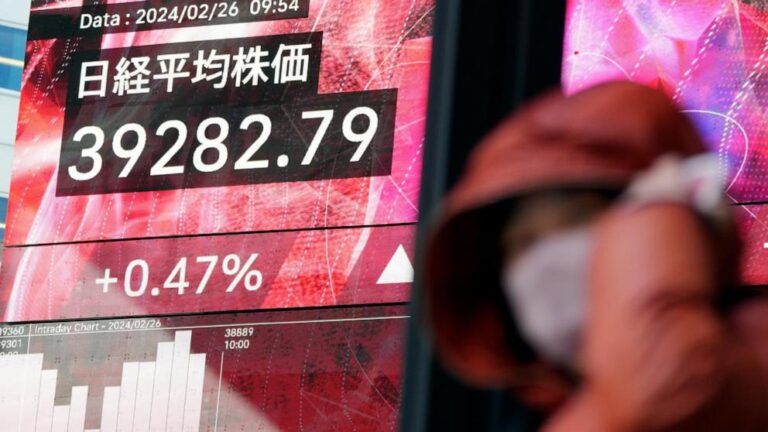BANGKOK — Asian stocks fell on Tuesday as U.S. stocks edged back from record highs.
Most regional markets fell, but Shanghai rose. US futures and oil prices were little changed.
Traders are on high alert after a new year's rally that has swept much of the world's markets.
“Overall, investors are enjoying a well-deserved breather at the start of the week,” Stephen Innes of SPI Asset Management said in a comment. “This subdued tone suggests that investor sentiment has softened following the recent technology-driven buying spree.”
Tokyo's Nikkei Stock Average, which has broken records twice in recent days, was flat at $39,238.82. This came after the government reported that consumer prices rose 2.2% in January from a year earlier, falling short of December's 2.6% but higher than expected. This confirmed expectations that the Bank of Japan would soon reverse its long-standing ultra-accommodative monetary policy, underpinned by a benchmark interest rate of -0.1%.
Chinese markets were mixed, with Hong Kong's Hang Seng Index down 0.4% to 16,572.75 and the Shanghai Composite Index up 0.5% to 2,992.30.
South Korea's Kospi fell 0.4% to 2,635.96, while India's Sensex fell 0.1%. In Bangkok, the SET fell 0.2%.
On Monday, the S&P 500 index fell 0.4% to 5,069.53 after closing at an all-time high last week. The Dow Jones Industrial Average fell 0.2% to $39,069.23, and the Nasdaq Composite Index fell 0.1% to $15,976.25.
Renowned investor Warren Buffett has warned shareholders not to expect any more “spectacular performance” as there aren't enough bargain stocks big enough to make a meaningful difference. As a result, Berkshire Hathaway has become one of the heaviest stocks on the market. Buffett is famous for buying companies when they are cheap.
Still, Buffett's company reported stronger results at the end of 2023 than analysts expected. The company's Class B shares, whose subsidiaries include GEICO, Fruit of the Loom and Brooks Running Shoes, initially rose more than 3%, but have since fallen 1.9%.
A growing number of analysts are warning that prices are getting too high.
The S&P 500 is on pace to end its fourth consecutive month of winning weeks and its 15th winning week out of the past 17 weeks. Also, the stock market may not have been cheap even when it bottomed out in October 2022.
This recent rally began last October on hopes that inflation had cooled enough for the Fed to cut interest rates several times this year. These cuts would ease pressure on the economy and financial system, while also reducing investment prices.
Expectations for a rate cut this year remain high, but traders are holding off on expectations after a stronger-than-expected economic report. Meanwhile, the data raises expectations that the company's profit growth could be stronger, contributing to stock prices.
Last week, Nvidia's stock price rose sharply as reports of a new blowout fueled the frenzy surrounding artificial intelligence technology. Nvidia, which makes chips that help power AI technology, rose another 0.3% on Monday and is already up nearly 60% so far this year.
We're in the final stages of earnings season for the major companies in the S&P 500, but there are still some big names providing updates this week. There are several things that could indicate how well U.S. household spending is holding up. Such spending has been one of the main reasons the U.S. economy has shattered expectations of a possible recession.
TJX, the parent company of Best Buy, Lowe's and TJ Maxx & Marshalls, is expected to make an announcement this week. So are some major technology companies, including Salesforce.com and HP.
Regarding the economic calendar, the U.S. government is expected to release the latest update on the Federal Reserve's preferred inflation measure on Thursday. It is usually a less influential report because data on consumer and wholesale inflation for the same month has already been released.
In other trading, benchmark U.S. crude oil fell 7 cents to $77.51 a barrel in electronic trading on the New York Mercantile Exchange. Brent crude, the international standard crude, fell 8 cents to $81.59 per barrel.
The dollar fell from 150.72 yen to 150.43 yen. The euro rose to $1.0855 from $1.0854.
___
AP Business Writer Stan Cho contributed.


